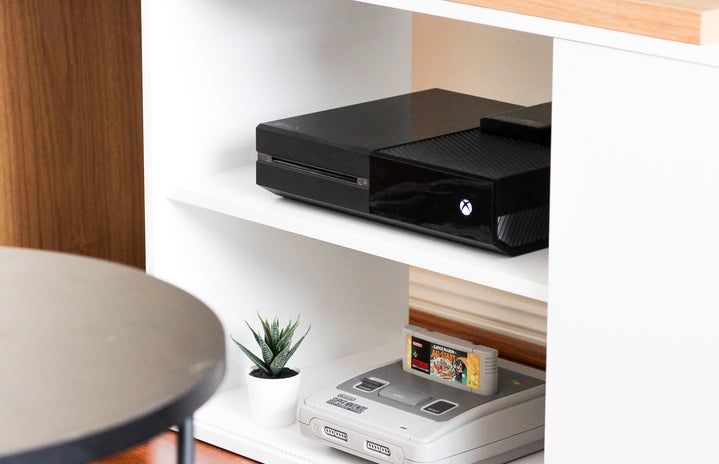Honestly, I never thought to myself in the duality of a learner and an educator, even though I have been a student since childhood, and now an educator for 4 years. Taking into consideration the way I was raised at home, I always had the idea that I have to keep studying for a great period of my life. I was taught NOT to settle for less, or how the younger generation likes to say, to never be basic. I always see myself as a person who can reach higher goals in life, even if that means working hard every single day to achieve it. Through the years, I have learned many aspects that, in one way or another, influenced my path as a learner and as an educator.
(Me as a Student-Learner. Picture taken by Dayanara Vazquez Comas)
To this day, I am still a student, a graduate student to be precise, at least that’s what I have to say to movie theater clerks when I give them my student I.D. from freshman year. When I reflect upon this, nothing was more meaningful in my life then being a student, and a learner, who is constantly gaining knowledge. Usually, the role of a student is temporary because it is only a status that is carried out until one has passed through a certain amount of trials in order to obtain a career. In my case, I do not see being a learner or my current status as a graduate student in a fixed mindset. This allows me to further develop my skill set and share my knowledge with other though academic forums. My path as a student has been a rewarding and reckless journey where I try my best to keep up with the expectations bestowed upon me, and to be able to show the best version of me I possibly can.
(Me as an Educator. IG: Problematicshopaholic)
My role as an educator should be to not only provide the best education, but to serve as a guide and role model to the future generation. Students are no longer in a position where they only depend on what the teacher provides for them in class. They are capable of searching for more outside sources and use what they have learned beyond the limitations of the classroom. An important aspect to consider when interacting with students, and one I always reflect about with my experience teaching ESL based courses, is their current acquisition of knowledge and how they perceive the world around them. Usually, a problem students currently face in school, more specifically in Puerto Rico, is they are left with unfilled spaces. What this means is that students only concentrate on the information which is given to them and they do not put it to practice or find a use for it. This could be a risk for students for they will lose the opportunity to gain skills and earn experience that will help them success in life and grow up to be responsible and active adults in society. I believe that as an educator, my teaching should have three major impacts on students which are the constant grown of knowledge students will acquire through hard work and effort, the ability to adapt and gain the skills needed to be a productive individual in the real world, and mold the student from an early age. Besides reading about my thoughts on what being a learner and educator means to me, let us take a look on some reflective thoughts through the perspective of fellow educators.
(Photo provided by Vashti N. Tacoronte Cruz)
“When considering my trajectory as a learner I can’t say I was always the best student. I’ve always had a lot of trouble organizing myself and this led me to struggle with assignments and classes. I also struggle with ADD, so that makes things even more complicated! Haha! Although I do struggle with these things I’ve been lucky to have caring, understanding, and genuinely kind professors who have helped me along the way. I’m not the best learner but I definitely still love to learn.” As an educator, Vashti N. Tacoronte Cruz always thought she would be strict and stern to her students but “my own experiences as a student and learner have influenced how I educate my students. I’ve focused on being kind and understanding to my students while providing structure and a clear message of encouragement. I also try to incorporate social topics into the class so that students start developing important critical thinking skills they will use in the future.”
(Photo provided by Yexcica A. Cappas Santiago)
As an educator, Yexcica A. Cappas Santiago considers herself as a “bridge” who guides her students from the unknown to the known. “My current experience in adult education as an ESL professor and facilitator at Progreso Latino and Genesis Center in Rhode Island has shown me how for some students English may seem like Freud’s uncanny concept; it starts with the idea of being something frightening precisely because it is not known or familiar creating peculiar senses of fear. It is because of this that translanguaging plays an important role in all my classes.” The use of translanguaging in her ESL classroom serves as a form of identity where students feel their cultural backgrounds are appreciated developing an environment of empathy and sense of self confidence; allowing them to learn naturally and not feel embarrassed. “I believe to be an educator is to never forget about being a student.”
(Photo provided by Angelica Roman-Martinez)
Angelica Roman-Martinez graduated from UPRM with a Masters Degree in Chemical Engineering, and her research was about polymers and drug delivery systems. While she was reflecting her years educating in the chemistry labs during her graduate studies, she had a lot of experiences to share. “During my years in the academia I had many opportunities to be an educator and positively impacts students and other members of the community. My first opportunity was as laboratory instructor of the General Chemistry course for freshman students, in which I have to say I was very meticulous and kind strict with them. My goal was to help them be prepare for the following years, which were going much harder. I invested myself teaching to ensure they excelled, and I was very happy to see that many of them passed the class and learned how to correctly perform experiments, analyze results and write reports of findings. After that experience I started working as a supervisor on a research laboratory and oversaw a student and his research project. This time I was more relaxed and let the student be more autonomous on his work. After that, I started working on my own research project and had several undergraduate students on my charge. They participated in every stage of the research experience and some of them had their independent projects, which I supervised along with my thesis advisor. I also participated on several projects and activities related to a prestigious nanotechnology project in the RUM. On that project, I visited high schools and middle schools to provide lectures about topic related to nanotechnology and its applications. I also participated in other on-campus and off-campus activities to different sectors of the community, like scientific demonstrations, science club meetings and summer research projects with teachers and high school students. Since the main goals of these activities was to wake interest on nanotechnology and STEM, we were enthusiastic, and we adjusted the activity to the level of understanding of the participant. We gave scientific demonstrations to several members of the community, mainly kids, but one of my favorite memories of that time was when we went to the Guerrero Prison in Aguadilla and gave a two-hour lecture for the prisoners enrolled the prison school program. It gave me great satisfaction to see how the learned and enjoyed the activity. As an educator, I have evolved over the years and learned from my mistakes. I am now more dynamic, flexible and less perfectionist. I have become more like a guide and less like someone who solely want people to follow her instructions. I have enjoyed this journey and have learned so much from the people I lectured. Being an educator gave me the chance to become a learner from my own students and serving them have been a much-appreciated privilege.”
(Featured: Foundations of English Education Spring 2018. Working on visual presentation of bilingual programs and policies. Photo provided by Adriana De Persia)
Adriana De Persia states the following about herself: “As a learner, I am an observer. I pay attention to what people say and do to discover underlying connections.”
(Photo provided by Luisa Feliciano)
Since Luisa Feliciano was a kid, she loved opening up broken things, such as toys or music players, to try and fix them. She also enjoyed gathering all of her plush toys together to teach them math. This helped Feliciano to understand later on that she is a visual, logical and kinesthetic learner, which is probably the reason why she became an engineer. “I currently volunteer as a robotics and coding teacher at a local school. As a teacher, I acknowledge that all students learn in different ways. Most students rely on visual, aural, verbal, physical, logical, or a combination of these learning styles. It is important for me as a teacher to help students figure out how they learn best and what works when they are striving to accomplish their academic goals. I have found that lectures including slides, video/audio, class discussions, and hands-on activities provide the best combination of learning styles to engage students and to foster their passion and love of learning.”



